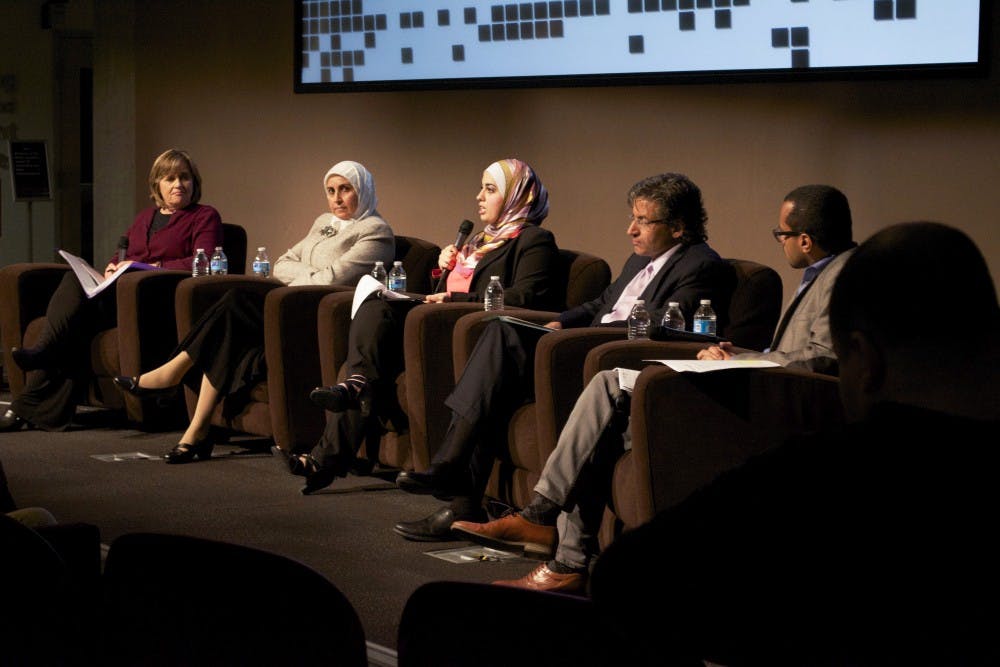 The panel for the lecture included the Rev. Kathleen Day, Dr. Suhir Bitar, Zana Alattar, M. Zuhdi Jasser, M.D. and Omar Mohammed on Monday March 4, 2015 at the Walter Cronkite School of Journalism and Mass Communication in Phoenix. (Krista Tillman/The State Press)
The panel for the lecture included the Rev. Kathleen Day, Dr. Suhir Bitar, Zana Alattar, M. Zuhdi Jasser, M.D. and Omar Mohammed on Monday March 4, 2015 at the Walter Cronkite School of Journalism and Mass Communication in Phoenix. (Krista Tillman/The State Press)Five people with strong connections to the conflict in Syria explained to students and community members how they could could help with the complicated situation in the Middle East Wednesday.
The Walter Cronkite School of Journalism and Mass Communication and The Arizona Republic co-hosted a panel discussion that explained misconceptions about Syria, as well as what life is like there for citizens as ISIS gains power and a totalitarian regime controls the nation.
Zana Alattar, a biochemistry and justice studies junior, was among the panelists. Alattar and her aunt, Suhir Bitar, who was also a panelist, do humanitarian work in Syria and try to raise support for the cause in the United States.
“I was born in Chicago, but I spent every summer in Syria,” Alattar said. “As the situation developed in Syria, I learned that many students were not aware about what was going on. As they learned about it, they realized it was something they could sympathize with and understand.”
There are about 10 million people who are internally displaced in Syria, meaning they are homeless for a variety of reasons, Alattar said. She said people looking to help the situation in Syria can look to organizations that go directly to the people, not through the government.
The modern conflict in Syria began in March 2011, but panelists agreed the unrest had been stretching for decades.
Dr. M. Zuhdi Jasser, founder and president of the American Islamic Forum for Democracy, said the humanitarian crisis has been happening since the 1960s in Syria, but the rest of the world had turned a blind eye in the 1980s leading up to the revolution.
“This is no different than the Nazi party,” Jasser said. “Any political opposition was destroyed, silenced or killed.”
Jasser said it can be a mistake to expect change to happen immediately after revolution, citing the American Civil War nearly a century after declaring independence, and the American civil rights movement, nearly a century after that.
“Revolution does not spread democracy overnight,” Jasser said.
 Moderator E.J. Montini with the panel for the lecture (from left to right): The Rev. Kathleen Day, Dr. Suhir Bitar, Zana Alattar, M. Zuhdi Jasser, M.D. and Omar Mohammed on March 4, 2015. (Krista Tillman/The State Press)
Moderator E.J. Montini with the panel for the lecture (from left to right): The Rev. Kathleen Day, Dr. Suhir Bitar, Zana Alattar, M. Zuhdi Jasser, M.D. and Omar Mohammed on March 4, 2015. (Krista Tillman/The State Press)All panelists agreed the current Syrian president, Bashar al-Assad, should be removed from power after numerous human rights violations, including the use of chemical weapons against Syrian people. The panelists said ISIS is growing in Syria due to Assad’s policies with ISIS members.
“ISIS is almost over in Iraq,” Bihar said. “It is just a matter of time because everyone is working against them. They are breeding in Syria because Assad is not killing them. It is a safe place for them.”
Jasser said the U.S. needs to be aware of where humanitarian aid is going, and warned support for Syria cannot be effective with Assad in power.
“The question is, who are the moderates,” Jasser said. “You cannot get rid of ISIS without first getting rid Assad, then you need to foster a secular society.”
Kathleen Day, Kayla Mueller’s pastor at NAU, said Mueller’s words got her involved in the humanitarian issues in Syria. She said Americans needed to educate themselves about the conflict and do what they could to help.
“We should do it to save our soul,” Day said. “We shouldn’t sit by and watch a genocide. What do our lives matter if these other lives don’t?”
Day said she hoped Mueller’s story and others would help inspire people to take action.
“I hope that we are restless,” she said. “I hope we can’t let it go. Never let suffering be normal.”
CORRECTION: A previous version of this article incorrectly stated the number of internally displaced people. This version has been updated with the correct information.
Reach the reporter at cvanek@asu.edu or follow her on Twitter @CorinaVanek.
Like The State Press on Facebook and follow @statepress on Twitter.




